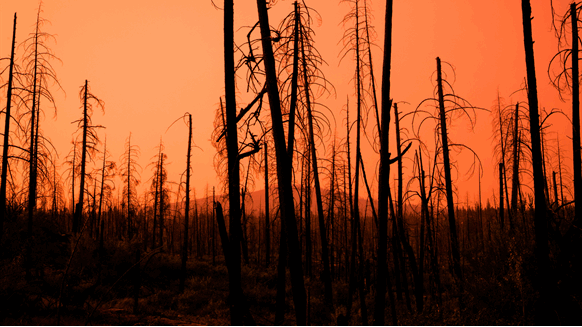
Canada Energy Regulator Monitoring Wildfire Impact

The Canada Energy Regulator (CER) said in a statement posted on its website on Tuesday that it is monitoring the impact of ongoing wildfires on its regulated facilities.
“We are aware of some companies that have reduced their operations across Alberta and will follow up with them as needed,” CER noted in the statement.
“The majority of CER-regulated pipelines are underground, putting them at a lower risk from fires. Pipelines are designed so they can be shut down quickly in sections if a fire gets close,” CER added.
CER notes on its site that it works to keep energy moving safely across the country. The organization regulates pipelines, energy development, and trade in the Canadian public interest, its site highlights.
As of 5pm local time on May 9, there were 82 active wildfires in Alberta’s forest protection area, according to the latest wildfire update posted on the Alberta government website. Of these fires, 24 were classified as out of control, 19 were being held and were not expected to grow beyond projected boundaries, and 39 were under control, the update outlined.
While evacuation orders for some areas have been lifted, thousands remain evacuated from northern and central Alberta communities, the latest update noted.
In a statement posted on her Twitter page earlier today, the Leader of the United Conservative Party of Alberta, Danielle Smith, said, “the wildfire situation is still serious”.
“I recently checked in on operations at the command center and also met with municipal and indigenous leaders across Alberta. I thank all civil servants, firefighters, officials, and support staff for their coordinated effort. We will get through this,” Smith added in the statement.
The wildfire situation is still serious.
I recently checked in on operations at the command centre and also met with municipal and indigenous leaders across Alberta.
I thank all civil servants, firefighters, officials, and support staff for their coordinated effort.
We will… pic.twitter.com/lI4HXKghbm— Danielle Smith (@ABDanielleSmith) May 10, 2023
In a statement posted on his Twitter page on May 8, Canada Prime Minister Justin Trudeau said he had spoken with Smith about Alberta’s wildfire situation.
“We’re working together to make sure everyone affected gets the assistance they need,” he said in the statement.
“The federal government will continue to work with provincial officials, with municipalities, and with Indigenous communities to support people in any way we can. Please stay safe, everyone,” he added.
I spoke with Premier @ABDanielleSmith today about Alberta’s wildfire situation. We’re working together to make sure everyone affected gets the assistance they need. The federal government will continue to work with provincial officials, with municipalities, and with Indigenous…
— Justin Trudeau (@JustinTrudeau) May 8, 2023
Energy Company Reaction
Several Canadian energy companies have reacted to the wildfires, including Canadian Natural Resources Limited, TC Energy, Cenovus Energy, Crescent Point Energy, and Vermilion Energy.
Pembina Pipeline Corporation also highlighted on Monday that wildfires in Alberta and B.C. had resulted in evacuation orders in several areas where Pembina has operations.
“Our priority is the health and safety of our people, impacted communities, and the environment,” the company said in a statement posted on its site.
“Pembina has accounted for all of our employees and contractors in the affected areas, and we are working to ensure they remain safe and receive the support they need. Our thoughts are with all impacted communities during this difficult time,” the company added.
“We are evaluating current and anticipated operational impacts, and as part of our emergency response procedures we are working with all appropriate authorities to ensure necessary protocols are in place to mitigate risks,” the company continued.
Pembina revealed in the statement that its Saturn I and II gas plants at the Saturn Complex north of Hinton, Alberta, and the Duvernay Complex, west of Fox Creek, Alberta, were shut down. These have a combined processing capacity of 443 million cubic feet per day net to Pembina, the company highlighted. Various related pump stations, gathering systems and other supporting infrastructure are also shut down, the company noted.
The Wapiti Gas Plant, KA Plant and K3 Plant, as well as the Peace Pipeline system 20-inch line from Fox Creek, Alberta to Edmonton, Alberta, were also temporarily shut down, although these assets have been safely restarted, the company revealed.
“To date, Pembina is not aware of any material damage to its assets,” the company said in the statement.
“We continue to monitor this dynamic situation closely and as soon as it is safe to do so, operators will begin accessing the other impacted sites and implementing a phased restart plan for the impacted assets,” Pembina added.
Pipestone Energy Corp. also revealed on Monday that its operations in the Grande Prairie area were being impacted by the wildfires.
“As a result of the precautionary shut-in of certain operated producing locations and third-party infrastructure, approximately 20,000 barrels of oil equivalent per day of production has been temporarily curtailed since the evening of May 5,” the company said in a statement posted on its site.
“The company is not aware of any significant damage or loss to its owned or third-party infrastructure. While timing remains uncertain, Pipestone is ready to restart production as soon as the currently shut down third party infrastructure is restarted,” Pipestone added in the statement.
To contact the author, email andreas.exarheas@rigzone.com
Published at Wed, 10 May 2023 08:31:30 -0700



